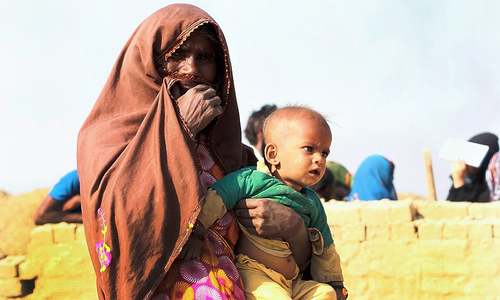Let me tell you a story that still haunts my mind about one of Pakistan’s biggest evils: bonded labour.
Our housekeeper Sajida had 13-year-old twin daughters, Bushra and Nusrat. They used to come over to our place after finishing work at our neighbour’s house.
A hardworking woman, Sajida raised the girls on her own in Islamabad as her husband and her only son worked in Chiniot.
Bushra was a firecracker while Nusrat was the quiet, studious one. She was a bright child who enjoyed studying and aspired to be a teacher. I used to help her with her school work, while Bushra happily watched Indian soap operas.
We had grown close to one another. But one fine morning, Sajida told us that she had to leave for Chiniot immediately because her husband was suddenly stricken with a serious illness.
Reluctantly, we bade farewell to the family, with the hope of seeing them again soon. However, days turned into months and there was no news of Sajida and her family.
Fast forward two years when one day our doorbell rang and outside was a haggard-looking Sajida. She appeared ten years older than when we last saw her.
She was accompanied by Bushra, who looked dull and sullen.
When my mother asked her about Nusrat, Sajida started crying uncontrollably.
What she told us next brought chills down my spine.
Sajida’s husband used to work at a farm but decided to start his own business. He took a small loan from a local brick kiln owner and hoped to return it within a month.
However, his business incurred a loss, and the debt kept increasing.
With no choice left, her husband started working at the kiln in order to pay back the loan.
One day he fell sick. To replace him, the kiln owner took his 15-year-old son for the job. The boy was kept in deplorable conditions, with his feet chained.
When Sajida and her daughters arrived at the village, the ruthless owner took in the girls and chained them too.
Two months later, Sajida’s son attempted to escape. But the owner and his men found out, and tortured him to death.
Nusrat could not bear the loss of her brother and fell very sick. But the kiln owner showed no mercy and forced her to work regardless.
She died two months later in captivity.
Sajida’s husband died a year after that.
Sajida had to save Bushra, who was now her only remaining family.
Bushra’s life was on the line as she was also gravely ill and imprisoned at the kiln.
But Sajida managed to repay a fraction of the loan to the owner. Perhaps not wanting another death, the owner set Sajida and Bushra free, and the mother and the daughter fled instantly.
I was overwhelmed with emotion as Sajida recounted her and her family’s heartbreaking ordeal.
The pain was too much to bear.
The last time when the plight of bonded labour in Pakistan, especially child labour, garnered widespread media attention, was when Brandon Stanton of Humans of New York (HONY) visited Pakistan last year.
He also brought to light the efforts of Syeda Ghulam Fatima of the Bonded Labour Liberation Front.
HONY managed to raise millions of dollars, as donations poured in from all over the world to help fight against this barbaric practice.
However, more than fundraising, we need to take steps that will eradicate bonded labour altogether.
The government has to take swift action to tackle this issue.
The Provincial Assembly recently passed the Punjab Prohibition of Child Labour at Brick Kilns Bill 2016.
It is a welcome measure but much more has to be done.
I pray that nobody, especially children, goes through the physical and mental torture that Sajida and her family went through.
Pakistan needs to be free of bonded labour of all types.














































